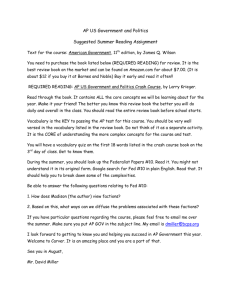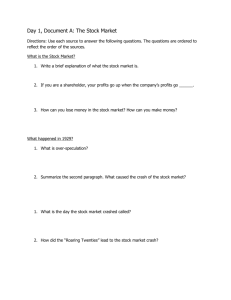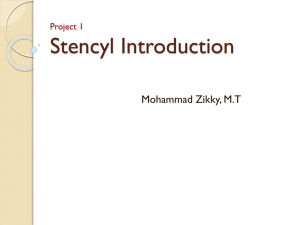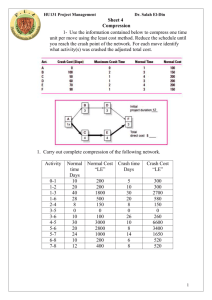Forms
advertisement
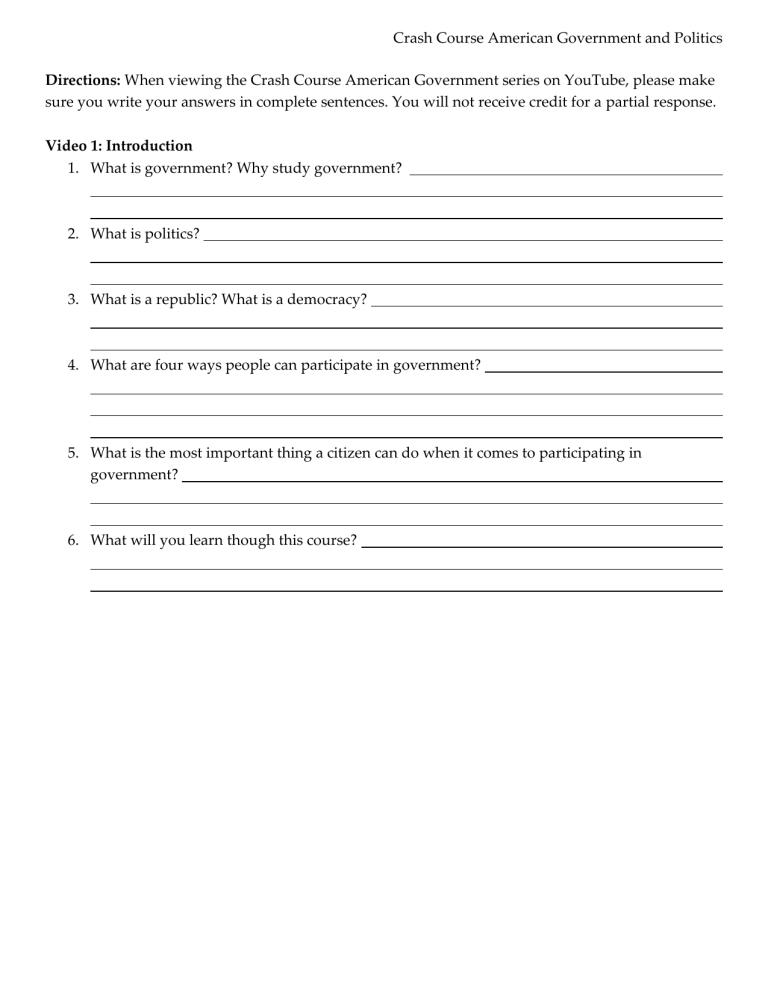
Crash Course American Government and Politics Directions: When viewing the Crash Course American Government series on YouTube, please make sure you write your answers in complete sentences. You will not receive credit for a partial response. Video 1: Introduction 1. What is government? Why study government? 2. What is politics? 3. What is a republic? What is a democracy? 4. What are four ways people can participate in government? 5. What is the most important thing a citizen can do when it comes to participating in government? 6. What will you learn though this course? Crash Course American Government and Politics Video 2: The Bicameral Congress Directions: When viewing the Crash Course American Government series on YouTube, please make sure you write your answers in complete sentences. You will not receive credit for a partial response. 1. Why the Federal Congress is considered the most important branch? 2. What are the names of the two houses of Congress? 3. What does the word bicameral mean? 4. What are the requirements for serving in the House of Representatives? 5. How is representation determined? 6. What are the six states with only one Representative? 7. What are the requirements for being a Senator? 8. Originally how were Senators chosen? What amendment changed this? How are Senators elected now? 9. What powers (3) are specific to the House of Representatives? 10. What powers (3) are specific to the Senate? 11. Why do we have a two house legislature (practical and historical)? Crash Course American Government and Politics 12. What were the terms of the Connecticut Compromise? 13. What is an intra-branch check? 14. What are the reasons for and the powers given to each house of Congress? Crash Course American Government and Politics Video 3: Separation of Powers and Checks and Balances Directions: When viewing the Crash Course American Government series on YouTube, please make sure you write your answers in complete sentences. You will not receive credit for a partial response. 1. What is main job of the Legislative Branch? 2. What is the main job of the Executive Branch? 3. Where does one find the power of the President? 4. What is main job of the Judicial Branch? 5. What is the point of the checks and balances system? 6. What are the Legislative checks over the Executive and Judicial Branch? 7. What are the Executive checks over the Legislative and Judicial Branch? 8. What the Judicial checks over the Executive and Legislative Branch? 9. Which branch has the most checks? 10. Why do we have Checks and Balances to begin with? 11. What Federalist Paper refers to the Checks and Balances system? Crash Course American Government and Politics 12. What is Madison’s thought on human nature? Crash Course American Government and Politics Video 4: Federalism Directions: When viewing the Crash Course American Government series on YouTube, please make sure you write your answers in complete sentences. You will not receive credit for a partial response. 1. What is Federalism? 2. In the US Federal System, what is the Federal government responsible for? What are the state governments responsible for? Do they share any responsibilities? If so, list them here as well. 3. What are the two types of Federalism? 4. How long did Dual Federalism last? 5. Discuss the characteristics of Dual Federalism. 6. What were the national government and state government responsibilities under Dual Federalism? 7. Who has more jurisdiction under Dual Federalism? 8. What is the Commerce Clause? 9. What “Deal” brought us Cooperative Federalism? 10. What are Grants-in-Aid? 11. What the two types of Categorical grants-in-aid? Crash Course American Government and Politics 12. What is a block grant? 13. What is Regulated Federalism? What are examples of mandates (funded or unfunded) set up the federal government? 14. What type of Federalism do we currently live under? 15. What form of Federalism did Nixon and Reagan popularize? 16. What are the three forms of New Federalism? Crash Course American Government and Politics Video 5: Constitutional Compromises Directions: When viewing the Crash Course American Government series on YouTube, please make sure you write your answers in complete sentences. You will not receive credit for a partial response. 1. What was the original purpose of the Philadelphia Convention? What actually happened? 2. What was wrong with the Articles of Confederation? 3. What was one thing the Articles government was able to accomplish? 4. What was the Virginia Plan? 5. What was the New Jersey Plan? 6. What is the Great Compromise? 7. How were slaves counted in terms of determining representation in the House of Representatives? 8. What are the characteristics and political thought differences between Federalist and AntiFederalist? 9. What was the final “compromise” of the Federalist? Crash Course American Government and Politics Video 6: Congressional Elections Directions: When viewing the Crash Course American Government series on YouTube, please make sure you write your answers in complete sentences. You will not receive credit for a partial response. 1. Why is the Congress considered the most important branch? 2. What does the Constitution say about Congressional Elections? 3. Who sets registration, scheduling and rules of elections? 4. What is a single-member district? And how are the number of districts determined? 5. What is an at-large election? 6. What are the general characteristics (3) of a candidate? 7. What was the average cost of a 2012 House and Senate winners? 8. What is an incumbency advantage? What are the reasons for these advantages? 9. What is the Franking Privilege? 10. What is the Electoral Connection? Address the three areas of representatives’ behaviors. Crash Course American Government and Politics Video 7: Congressional Committees Directions: When viewing the Crash Course American Government series on YouTube, please make sure you write your answers in complete sentences. You will not receive credit for a partial response. 1. Why does Congress have committees? 2. How many standing committees are there in the Senate and House of Representatives? 3. What is a joint committee? 4. What is a conference committee? 5. Does serving on committee fall in line with the Election Connection? If yes, please explain how. 6. Who has proposal power? 7. What is gatekeeping authority? 8. Who manages the actual process of mark-up? 9. How do committees exercise oversight? 10. How did Newt Gingrich increase the power of the Speaker? 11. What are the two types of Congressional staff? Crash Course American Government and Politics 12. List some of the responsibilities of Congressional staff? 13. What is the function of the Congressional Research Service? Government Accountability Office? Congressional Budget Office? 14. What is the caucus system? List some of the caucuses discussed in the video. 15. What is the purpose of the caucus? Crash Course American Government and Politics Video 8: Congressional Leadership Directions: When viewing the Crash Course American Government series on YouTube, please make sure you write your answers in complete sentences. You will not receive credit for a partial response. 1. How is the leader of the House of Representatives chosen? 2. What is the title for the leader of the House of Representatives? Who is the current leader, third in line for the President? 3. What are titles of the two assistants to the leader? And what are their responsibilities? 4. Who is the spokesperson for the minority party? 5. How is leadership determined in the Senate? 6. What is the President Pro Tempore? 7. What are the powers of being in Congressional leadership? 8. Specifically discuss the powers of the Speaker of the House. 9. Why is Agenda Setting considered a negative power? 10. What are the ways political parties matter in Congress? How do political parties influence Congress? Crash Course American Government and Politics Video 9: How a Bill Becomes Law Directions: When viewing the Crash Course American Government series on YouTube, please make sure you write your answers in complete sentences. You will not receive credit for a partial response. 1. What is the first step (formal) on how a bill becomes law? Who can help with the idea of a law? 2. After the bill is introduced where does it go? 3. If the mark-up bill receives a majority from the committee, where does it go? 4. When it comes to floor debate in the Senate, what types of rules with they determine? 5. What is an open rule and closed rule? What are their implications? 6. What is the one difference in the step-by-step process of how a bill becomes law in the House? 7. How many votes are needed for the House to approve a bill? 8. If both houses are required to pass the same version of a bill, how often does that happen? What is the solution if they don’t have the same version? 9. What are the options for the President when it comes to signing bills into law? 10. What is the one check on the President regarding bills? Crash Course American Government and Politics 11. Why do so few laws get passed? 12. What are all the places/ways a bill can die? Which is the most common? Crash Course American Government and Politics Video 10: Congressional Decisions Directions: When viewing the Crash Course American Government series on YouTube, please make sure you write your answers in complete sentences. You will not receive credit for a partial response. 1. What are the three main factors/agents when it comes to influencing a congressman’s decisions? 2. What are the implications to the factors/agents? 3. What is the main thing that interest groups provide to a Congressman? 4. When are interest groups most influential? 5. What is logrolling? 6. Where does logrolling occur the most? 7. Why does a divided government work well for Congress? 8. When are political parties most influential? Crash Course American Government and Politics Video 11: Presidential Power Directions: When viewing the Crash Course American Government series on YouTube, please make sure you write your answers in complete sentences. You will not receive credit for a partial response. 1. What does the Constitution say about the President? 2. How is the President elected? Is this democratic? 3. What are the President’s powers? 4. What are formal and informal powers? And where do they originate? 5. Discuss the responsibilities as Commander-in-Chief. 6. How many generals have served as President? 7. Discuss the responsibilities as Chief Diplomat. 8. Why is the State of Union important? (acting as a Chief Agenda Setter) 9. Why did the Framers curtail the President’s powers? Crash Course American Government and Politics Video 12: Presidential Powers 2 Directions: When viewing the Crash Course American Government series on YouTube, please make sure you write your answers in complete sentences. You will not receive credit for a partial response. 1. What are the Presidents informal (implied) powers? Inherent powers? These will run throughout the video. 2. What locations has the President sent troops when he did not ask for a war declaration? 3. What is the War Powers Resolution? 4. What is the most important difference between a treaty and an executive agreement? 5. List the two Executive Agreements discussed in the video. 6. Which President issued the most executive orders? Crash Course American Government and Politics Video 13: Congressional Delegation Directions: When viewing the Crash Course American Government series on YouTube, please make sure you write your answers in complete sentences. You will not receive credit for a partial response. 1. What is a delegate? 2. What is the delegate role? 3. What is a trustee? 4. What is delegation? 5. What are the 3 reasons for Congress to delegate powers to the Executive Branch? 6. What are the practical reasons? 7. What are the historical reasons? 8. What are the political reasons? 9. What is the general rule when it comes to Congressional Delegation? Crash Course American Government and Politics Video 14: How Presidents Govern Directions: When viewing the Crash Course American Government series on YouTube, please make sure you write your answers in complete sentences. You will not receive credit for a partial response. 1. Who is at the top of the executive pyramid? 2. Where are most policy decisions made? 3. Who makes up the White House Staff? 4. Which staff members do you believe are the most important? 5. What is the Executive Office of the President? 6. What positions within the EOP would you consider the most important? 7. What is the Cabinet? 8. What is the purpose of a government corporation? 9. What are the two most well-known government corporations? 10. What is the best known independent agency? List some others. 11. What is the best known regulatory commission? List some others. Crash Course American Government and Politics 12. What are the president’s three main strategies when it comes to leadership? Circle the most important one. 13. What is the bully pulpit? 14. What does the Office of Management and Budget do? 15. List some of the most important Executive Orders? 16. Why do Presidents increasingly rely on administrative strategies? 17. Explain the historical argument for the Founders preferred having a weak executive branch. 18. Explain the argument for a stronger executive branch. Crash Course American Government and Politics Video 15: Bureaucracy Basics Directions: When viewing the Crash Course American Government series on YouTube, please make sure you write your answers in complete sentences. You will not receive credit for a partial response. 1. What is a bureaucracy? 2. Why do we have bureaucracy? 3. What is the function of the bureaucracy? 4. What are regulations? And how do they relate to the bureaucracy? 5. What is administrative adjudication? 6. What is the main argument for privatization? 7. Why do we need bureaucracy? Crash Course American Government and Politics Video 16: Types of Bureaucracies Directions: When viewing the Crash Course American Government series on YouTube, please make sure you write your answers in complete sentences. You will not receive credit for a partial response. 1. What is the Executive Department? And what is the general title shared by most? 2. What are independent agencies? What are some examples? 3. What are independent regulatory agencies? What are some examples? 4. What are government corporations? List the examples. 5. What is the purpose of the FDA, CDC, and NIH? List another client serving agency. 6. How do agencies maintain the Union (5)? 7. How do agencies collect revenue? 8. How do agencies provide security? (internal and external) 9. How do agencies regulate economic activities? 10. How do agencies redistribute economic resources? Crash Course American Government and Politics 11. What is the purpose of the Social Security Administration? 12. How do bureaucrats get its power? Crash Course American Government and Politics Video 17: Controlling Bureaucracies Directions: When viewing the Crash Course American Government series on YouTube, please make sure you write your answers in complete sentences. You will not receive credit for a partial response. 1. How are federal bureaucracies funded? 2. How do we control the federal bureaucracies? 3. What are before-the-fact controls? 4. What is procedural control? 5. What are after-the-fact controls? 6. What is government’s own watchdog agency? 7. What are three reports mentioned in the video, commissioned for investigation? 8. What is the best way to control the bureaucracy? 9. What is deregulation? And what is its purpose? 10. What is devolution? Why is it considered a bait and switch? 11. What is privatization? And what attempts has the government made to privatize? Crash Course American Government and Politics Video 18: Legal System Basics Directions: When viewing the Crash Course American Government series on YouTube, please make sure you write your answers in complete sentences. You will not receive credit for a partial response. 1. What are the three basic functions of the court system? 2. Where does most legal action occur? 3. What are the four main characteristics of the federal court system? 4. What are statutes? 5. What is common law? 6. What are the two types of court which make civil law? 7. What types of courts have original jurisdiction? 8. What types of courts have appellate jurisdiction? 9. What are the three types of law? 10. What is public law? Crash Course American Government and Politics Video 19: Structure of the Court System Directions: When viewing the Crash Course American Government series on YouTube, please make sure you write your answers in complete sentences. You will not receive credit for a partial response. 1. Why is the American Court system hierarchical? 2. How many federal US District Courts are there? 3. How many federal appeals courts are there? 4. What are the four scenarios where the federal courts have original jurisdiction? 5. How does a case get to the Supreme Court? 6. When does the Supreme Court have original jurisdiction? 7. What is the criteria for an appeals case to make it to the Supreme Court? 8. How do the justices decide to hear a case? 9. What are the cases the courts will almost always take?
